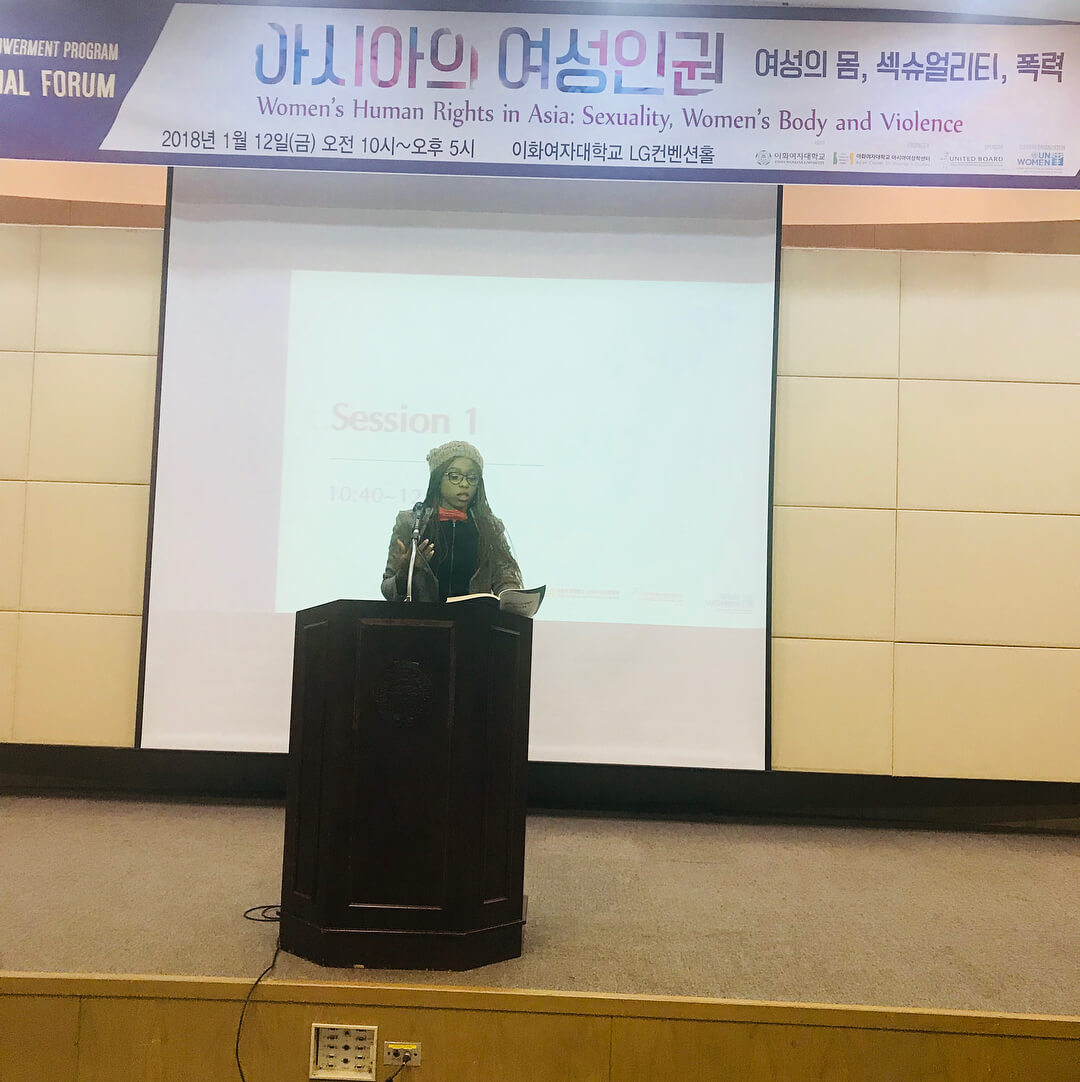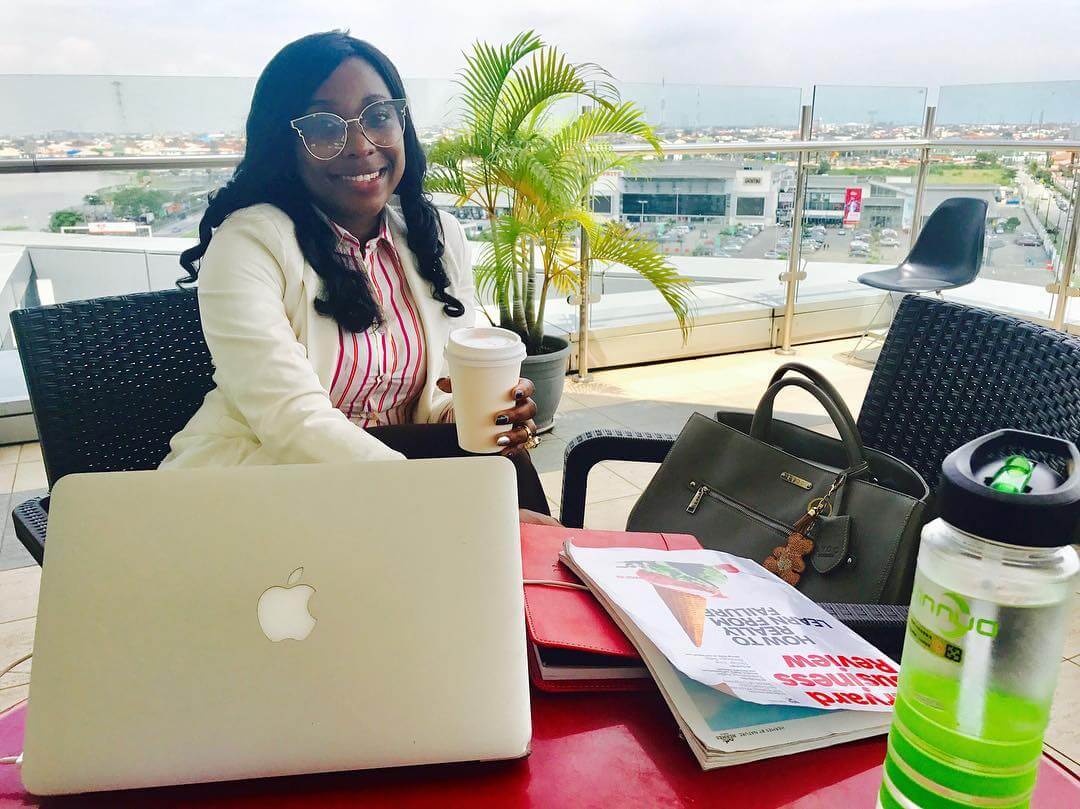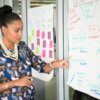One thing that attracted me to Mervis is her strength. I honestly don’t know how she does it. Combining building a career, writing a book, saving the world with World Food Bank, fighting for the rights of the girl child, being a super mommy and not losing the yummy wife status, Mervis was lowkey my woman of the year 2017. Recently, she presented a paper on Sexual Violence and Online Body-Shaming: The Nigerian Context at the 13th Ewha Global Empowerment Programme (EGEP) organized by the Asian Center for Women Studies; Seoul and supported by the United Nations Entity for Gender Equality and the Empowerment of Women (UN Women). I finally got the chance to have a chit-chat with her
Mervis is extremely passionate about issues that affect young people and the girl child. She considers herself an activist and an influencer. Currently working in public service and publishing, as Founder The R.E.N.E.W. Initiative and Editor-in-Chief of Treasure Teens Magazine; she is able to bring to the fore, issues that affect young people especially girls. Her most popular magazine issues have had themes like Owning Your Body in A Relationship, Dealing with Sexual Assault, FGM & The Dangers It Poses etc. Through her organization, Mervis holds quarterly seminars at high schools and teach on topics such as ‘When No Means No’, ‘Why Boys Should Be Feminists’, ‘You Too Can Fly’ etc.
She was the youngest speaker at the 4th African Conference on Sexual Health & Rights; Addis Ababa, Ethiopia in February 2010, where she presented a paper on Stigmatization of People Living With HIV/AIDS. She was also part of the team that advocated for the inclusion of Sex Education into the high school curriculum in Nigeria, when she worked for internationally-acclaimed NGO: Action Health Incorporated. When the Federal Ministry of Education yielded; her team developed the scheme of work which is still currently used to teach high school students about sexuality, family life, and relationships.
In 2017, she received funding from the Swedish Alternative Nobel Right Livelihood Grant Prize, which she used in pursuing a writing project on maternal health; with a specific focus on Obstetric Fistula. Recognized in 2011 by Thisday Newspaper among Twenty Nigerian Influencers Under Twenty, and Y!Naija as one of the new school of Nigerian leaders, Mervis lives in Lagos with her husband and two daughters.
So, I knew I had to interview her! 
What’s your take on the plight of the girl child in Nigeria?
I think that the Nigerian girl child…and in fact, the African girl child is one of the most vulnerable groups of people in the world. Girls in Africa face all sorts of socio-cultural, institutional, physical and emotional barriers as they grow. Most lack opportunities, protections, and services that are required to ensure their empowerment and safe transition into adulthood. They are most susceptible to violence, just because of their gender and are let down by those who should be protecting them. 93.9% of all reported cases of violence in Nigeria are against women. Nigeria also accounts for 14% of the global index of maternal mortality, most of these unfortunate cases being young women and the girl child.
We are fascinated by your recent talk on sexual abuse on the girl child and the fact that you shared your experience. How do you think other women can work to stop this?
I like to think that culture is dynamic and not as hegemonic as we like to think. The population ratio of men to women in Nigeria is 103:100. That means, for every 103 men, there are 100 women. And so, numerically, we have a wonderful avenue to cause change; if only we can stand together. The older generation of women has failed us because I think that they are not doing enough to protect us, and the generation after us. I have seen the power of women uniting against a common cause. For example, in my village in South-Eastern Nigeria- widowhood rites were quite prevalent until a particular scenario where a widow was about to be shaved and given the water used in bathing her husband’s corpses. The umuada (daughters of the land) rallied around her and told the chiefs they would all have to shave and drink the same hideous liquid if they insist on such rites. That was the last we heard about widow rites in my village. It’s the same with Female Genital Mutilation (FGM), child marriage, girl child education etc. The communities that have laid to rest those practices have women at the forefront of the battlefield. However, I wonder who would be the Funmilayo Ransome-Kuti, Margaret Ekpo, Hajiya Gambo Sawoba, Kudirat Abiola, Safinat Mohammed and co of this decade? Women are doing amazing and breaking glass ceilings in business, at the workplace, ministry and internationally…. but not enough in civic leadership. Not enough to teach us girls about the mistakes that they made, not enough women in politics, not enough women clamoring for women’s rights. I firmly believe that those who have a voice and a platform should speak up for those who don’t. On that note, I love and admire the likes of Omoni Oboli, Omotola Jolade Ekeinde and Stephanie Linus; who are not in primarily civic leadership positions but use their platforms and resources to create awareness about these gender-related and girl child issues.
A lot of people, particularly younger women, dread the idea of having a female boss. Have you ever had any? What is (was) the experience like?
Yes, I have had female bosses. My major work experience is with Action Health Incorporated and the Director; Dr. Nike Esiet remains one of my mentors to date. She discovered me at sixteen and is always there to encourage and support me, even when I wasn’t working with the NGO anymore. I have also worked with Adesuwa Nwokedi who runs a website and support group for women battling infertility (thefertilechickonline.com) and I learnt so much from her. We still have a good relationship till date. I think in the workplace, women are realizing that we are better off working together and supporting one another. Yes, there are those who come off as difficult, but once the root-issues are dealt with, I believe that female bosses can be a strong source of support and influence.
Recently we were having a conversation during a Meetup about times when you don’t feel fast paced enough, smart or even creative. Do you have moments like that? What do you do?
Well, I agree that you can’t feel creative and smart all the time and I have learned to use those down moments as a time to detox my mind, relax and just focus on the bigger picture. I have a Ph.D. in making time for myself and I believe a lot in rejuvenation and self-care, and would say to not beat yourself up so much, but use those moments to read a good book, go to your happy place, show up for friends, spend time with family etc. It’s amazing how the mojo always comes back right after!
Your Instagram feed shows a lot of you as a growing professional and a doting mom. How have you been able to effectively manage these important aspects of your life?
At the center of it all is GOD. I rely on the Holy Spirit to help keep everything running. It’s not easy to have a professional career, keep up with NGO advocacy and activism; which is my passion, find time to write as a freelancer, take care of two kids and a husband, and make out time for myself and my friends. I do have a very supportive husband who brings his 100% to the table, a trusted family I can leave my kids with when I need to travel, and wonderful bosses who give me time off when I have to be at an event or attend a training.
Tell us about 3-5 Women you admire. Also, your favorite books, websites, and communities.
I love, admire and follow closely with Sheryl Sandberg, Hillary Clinton, Adaora Mbelu, Jumoke Adenowo and Ijeoma Umebinyuo. Favourite books are A Feminist Manifesto by Chimamanda Adichie, Questions for Ada by Ijeoma Umebinyuo, Lean In by Sheryl Sandberg and Bad Feminist by Roxane Gay. For websites and communities; they are too many to list! Too many!!
What do you love most about living in Lagos?
The beaches!! Those are my happy places and I love that I can easily drop the kids off at my mom’s and spend a quiet day at the beach alone when I need to reboot. I have also met amazing people in Lagos, but trust me; I would be living in Abuja, if it weren’t for the beaches in Lagos. The traffic can drain!
Interview by Ifedayo Ward.
Ifedayo Ward is a Political Philosopher, Pan Africanist, and Feminist. She is championing the course of mental health as a pioneer of Mentally Aware Nigeria Initiative. Ife full-times as a brand manager of a technology brand. Follow her on Twitter.







